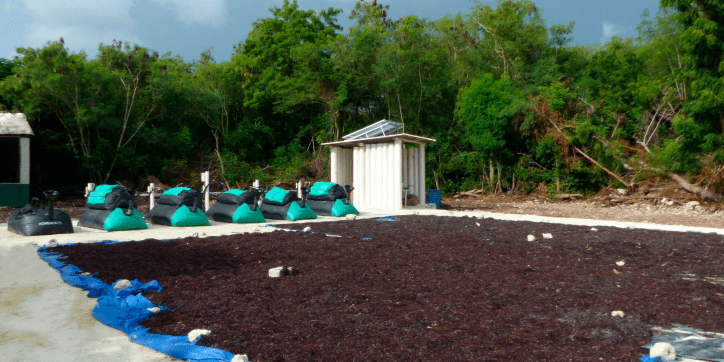University and entities generate biogas from sargassum co-digestion
With this technology, it is intended to present an opportunity for the valorization of sargassum and kitchen waste for the tourist area of Punta Cana, since the efficient production of this biofuel can turn it into an alternative to liquefied petroleum gas (LPG).

APEC University (Unapec) announced today that through an innovative alliance between this institution, the Punta Cana Group Foundation (FGPC), and the Israeli company Y.A. Maof, the first experimental field station was established in the country to evaluate the biomethane potential of sargasso in anaerobic digestion processes. The station also analyzes the potential of co-digestion of kitchen waste with sargassum, as a service to Punta Cana's tourism and commercial sector.
"In line with Unapec's mission, since 2018 it has taken on the challenge of facing the sargassum problem not only as a topic for academic discussion but as a national problem that must be worked on from deeper areas through research and to find solutions to mitigate the negative impact caused by the arrival of the macroalgae to our territory," said Unapec research director, Alvin Rodríguez.
In the absence of a coordinated national strategy, Punta Cana Group and the private sector have had to lead the creation of various solutions to protect our beaches from sargassum with partners such as Unapec and Maof. Through various experiments, including the biodigestion of sargassum, we are creating different products to value the seaweed as a productive resource".
Emin Rivera, dean of the Faculty of Science and Engineering, pointed out that the experimental station has a capacity of 7,200 liters of inoculum distributed in 6 flexible biodigesters, assisted by a heating system.
"The system, designed by Unapec's technical team, is capable of digitally controlling the individual temperature of the units, as well as an automatic monitoring and data logging system. Over two years, protocols, processes, and different tools have been developed and adapted to make it possible to accurately and reliably capture the data generated by the system," Rivera added.
Unapec's research team indicates that the protocol executed consists of the first period of 30 days of adaptation and the second period of 30 days of feeding and evaluation of production parameters.
He highlighted that during this stage 70 kilos of sargassum and 210 kilos of organic kitchen waste were processed, reaching a daily generation of 2,800 liters of biogas. This pilot represents about 1,400 liters of methane gas that can be used in domestic or industrial stoves that are prepared for natural gas or in a boiler system for laundry.
This technology is intended to present an opportunity for the valorization of sargassum and kitchen waste for the Punta Cana tourist area since the efficient production of this biofuel can turn it into an alternative to the liquefied petroleum gas (LPG) used by hotels in different processes. The ultimate goal is to prevent the sargassum collected on the beaches from ending up in final disposal that negatively affects the environment.




